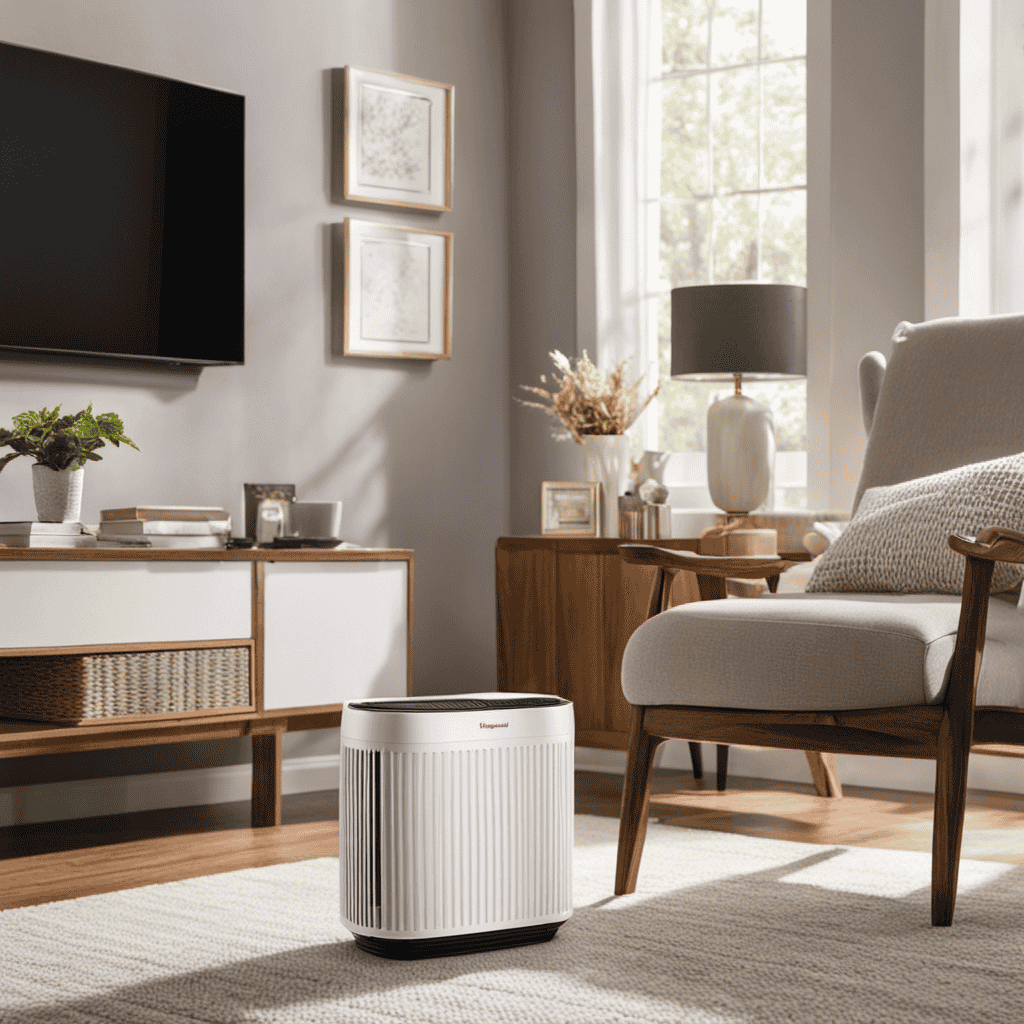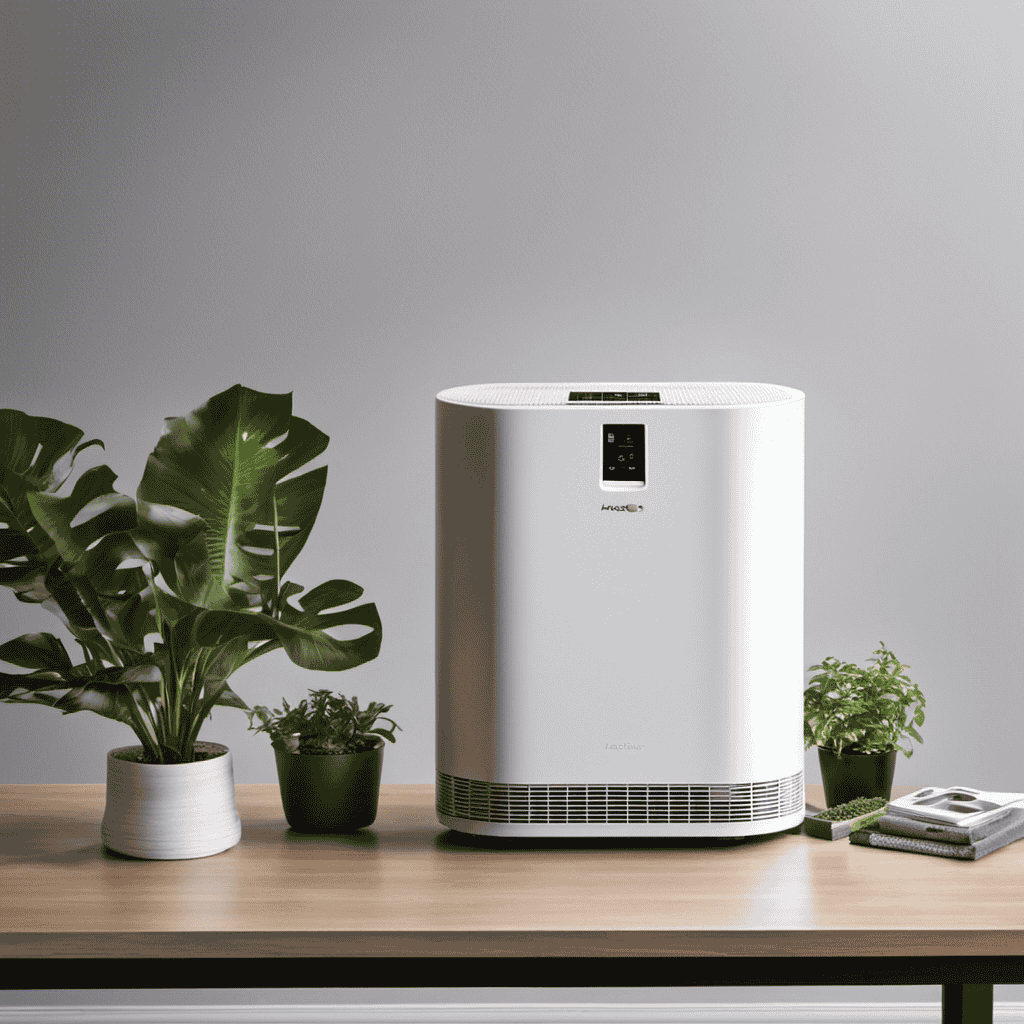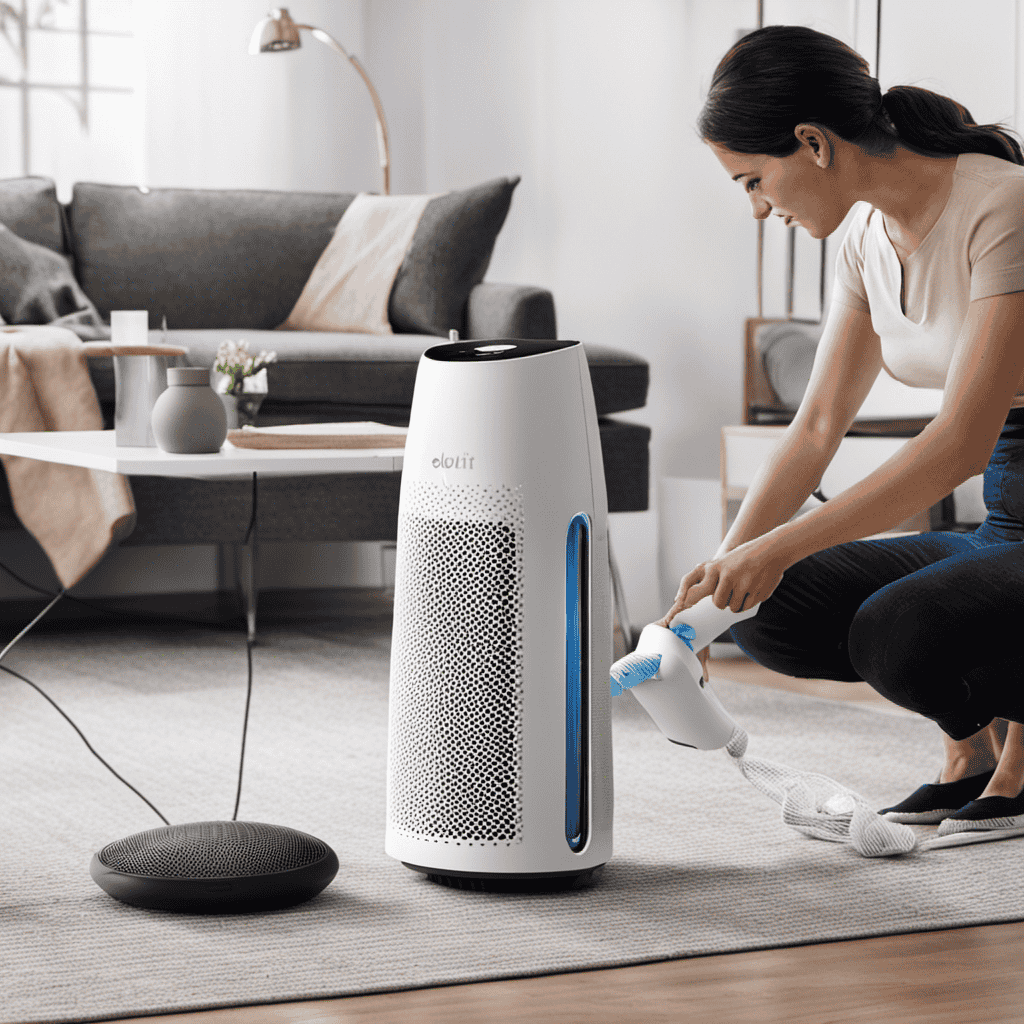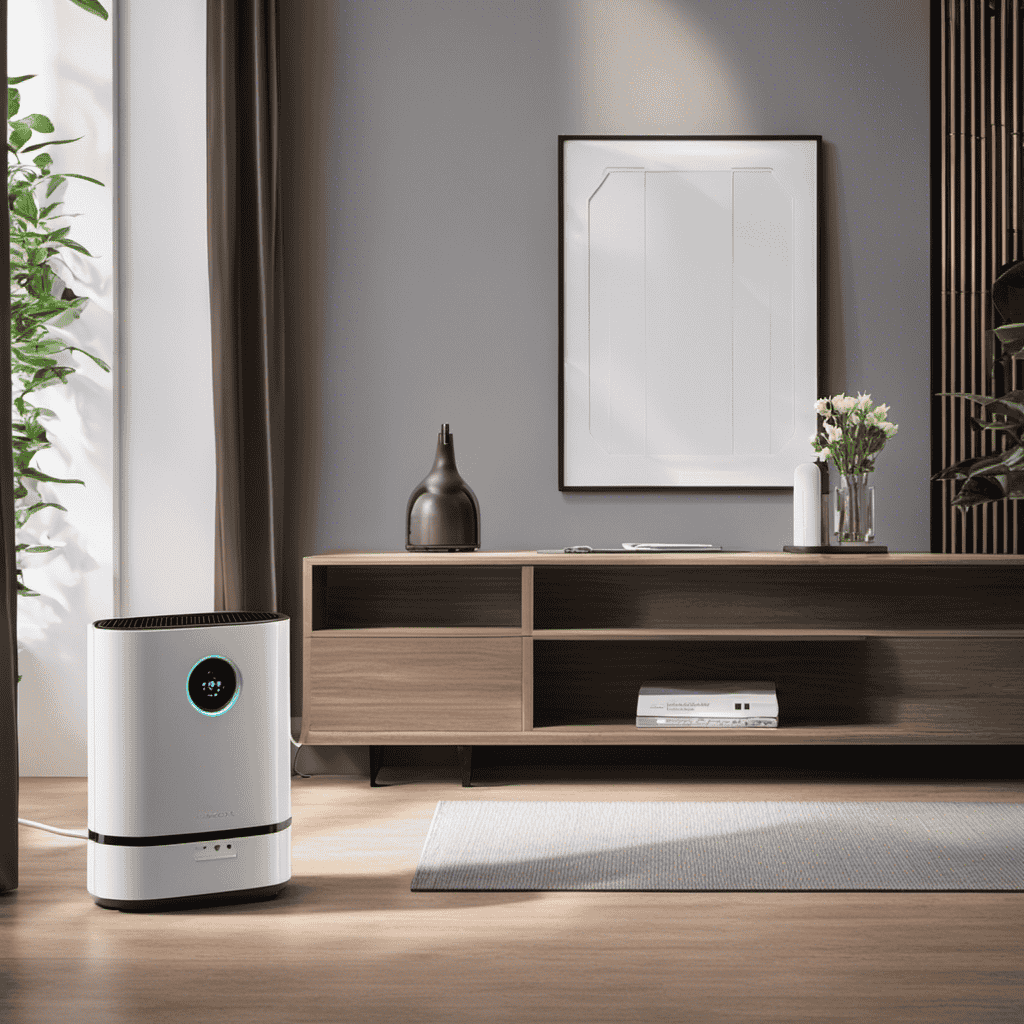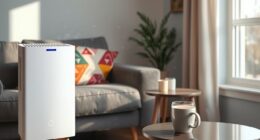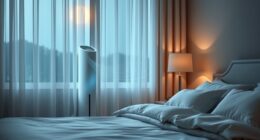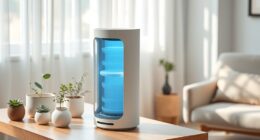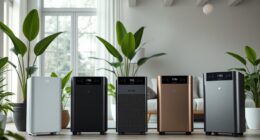When it comes to keeping the air in my home clean, I trust in my Honeywell air purifier, as the old adage goes, “A breath of fresh air is priceless.”
But how often should I change the filter to ensure optimal performance? In this article, I will provide you with the essential information you need to know about the frequency of Honeywell air purifier filter changes.
From the factors affecting filter lifespan to signs that indicate it’s time for a replacement, let’s dive into this technical and informative topic.
Key Takeaways
- Air quality in your environment affects filter lifespan
- Regular changes maintain efficiency and effectiveness of air purifier
- Different types of Honeywell Air Purifier Filters have different lifespans and replacement costs
- Regular cleaning and replacing of filters is essential for optimal filter performance
Factors Affecting Filter Lifespan
You should consider factors like air quality and usage habits to determine how often you need to change your Honeywell air purifier filter.
Several factors can affect the lifespan and efficiency of your filter. One of the main factors is the air quality in your environment. If you live in an area with high pollution or allergens, your filter may get clogged more quickly and require more frequent changes.
Another factor is your usage habits. If you run your air purifier for extended periods of time or at higher fan speeds, the filter may become dirty faster.
Additionally, common mistakes in filter maintenance, such as not cleaning the pre-filter or not replacing the filter when necessary, can also impact its efficiency.
Considering these factors will help you determine the appropriate filter change frequency for your Honeywell air purifier.
Now, let’s move on to the recommended filter change frequency.
Recommended Filter Change Frequency
The recommended frequency to replace the filter in your Honeywell air purifier is every few months. Regularly changing the filter is crucial to maintain the efficiency and effectiveness of your air purifier.
By doing so, you ensure that the purifier continues to remove airborne particles and allergens from your indoor air, providing you with clean and fresh air to breathe.
Regular filter changes also help to prolong the lifespan of your air purifier, as a clogged or dirty filter can strain the system and reduce its performance.
Additionally, replacing the filter on a regular basis helps to prevent the build-up of pollutants and contaminants, which can negatively affect the air quality in your home or office.
Therefore, following the recommended filter change interval is essential for optimal performance and the overall well-being of your air purifier.
Signs That Your Filter Needs Changing
If your air purifier’s filter is dirty or clogged, it may not be effectively removing pollutants from the air. Regularly cleaning or replacing the filter is crucial for maintaining the performance of your air purifier. Here are some signs that indicate your filter needs changing:
| Signs | What it means |
|---|---|
| Reduced airflow | A clogged filter restricts the flow of air. |
| Visible dirt and dust | Accumulation of particles on the filter is a clear sign. |
| Unpleasant odors | A dirty filter can no longer eliminate unwanted smells. |
| Allergy symptoms | Increased sneezing or coughing may indicate a dirty filter. |
To avoid common filter replacement mistakes, consider DIY filter cleaning. However, be cautious not to damage the filter during the process. Follow the manufacturer’s instructions and use a soft brush or vacuum to remove dust and debris. Alternatively, you can purchase a replacement filter to ensure optimal performance. By properly maintaining your filter, you can extend its lifespan and enhance the effectiveness of your air purifier.
How to Extend the Life of Your Filter
To extend the life of your filter, regularly cleaning or replacing it is crucial for maintaining optimal performance. Cleaning your air purifier filter is a simple process that can greatly benefit your overall air quality.
First, consult your manufacturer’s instructions for specific cleaning guidelines. Most filters can be cleaned by gently vacuuming or rinsing with water. Be sure to let the filter fully dry before reinserting it into the air purifier.
Regular maintenance not only improves the filter’s efficiency but also helps to prolong its lifespan. By removing dust, allergens, and other particles, you can ensure that your air purifier continues to work effectively.
Now, let’s explore the different types of Honeywell air purifier filters and their unique features.
Different Types of Honeywell Air Purifier Filters
There are various types of Honeywell air purifier filters available, each with its own unique features. When choosing a filter for your Honeywell air purifier, it is important to consider the different filter sizes and the filter replacement cost.
Here are three types of Honeywell air purifier filters that you can choose from:
-
HEPA Filters: These filters are designed to capture 99.97% of airborne particles as small as 0.3 microns. They are highly efficient at removing dust, pollen, pet dander, and other allergens from the air.
-
Carbon Filters: These filters are effective at removing odors, gases, and VOCs (volatile organic compounds) from the air. They are commonly used in areas with strong odors or in homes with pets.
-
Pre-Filters: These filters are the first line of defense in trapping larger particles such as dust and hair. They help prolong the life of the main filter by preventing it from getting clogged too quickly.
When it comes to filter replacement cost, it is important to consider both the initial cost of the filter and the frequency at which it needs to be replaced. HEPA filters, for example, tend to be more expensive but have a longer lifespan compared to carbon filters. Pre-filters, on the other hand, are usually more affordable and need to be replaced more frequently.
Proper Maintenance for Optimal Filter Performance
Regular cleaning and replacing of the filters is essential to ensure optimal performance of your Honeywell air purifier. Not only does it improve the air quality in your home, but it also prolongs the lifespan of your device. Cleaning the filters is a simple process that can be done with a vacuum or by rinsing them under running water. For a more thorough cleaning, you can use mild soap and water. It is recommended to clean the filters every 3 months or sooner if you notice a decrease in performance. As for replacing the filters, it is generally recommended to do so every 6 to 12 months, depending on usage and the type of filter. Regular maintenance of your Honeywell air purifier will ensure that it continues to provide you with clean and fresh air.
| Filter Type | Cleaning Frequency | Replacement Frequency |
|---|---|---|
| HEPA | Every 3 months | Every 6-12 months |
| Carbon | Every 3 months | Every 6-12 months |
| Pre-Filter | Every 3 months | Every 3-6 months |
| Odor-Reducing | Every 3 months | Every 6-12 months |
What Happens If You Don’t Change the Filter on Time
If you neglect to replace the filter on time, the performance of your air purifier may suffer. Here are the consequences of not changing your Honeywell air purifier filter on time:
-
Reduced air quality: A clogged filter cannot effectively capture pollutants, leading to poor indoor air quality. This can cause allergies, respiratory issues, and other health risks.
-
Decreased efficiency: An overused filter restricts airflow, making the purifier work harder to circulate clean air. This leads to increased energy consumption and higher utility bills.
-
Shortened lifespan: Continuous strain on the air purifier can cause components to wear out faster, decreasing the overall lifespan of the device.
To avoid these consequences and maintain a healthy indoor environment, it is crucial to replace your Honeywell air purifier filter as recommended.
Let’s now address some frequently asked questions about Honeywell air purifier filter changes.
Is the Frequency of Changing Air Purifier Filters Different for Different Brands?
When it comes to levoit air purifier filter upkeep, the frequency of changing filters may vary among different brands. While some brands recommend replacing filters every 6-12 months, others may suggest a longer or shorter time frame. It is essential to follow the specific guidelines provided by the manufacturer for optimal performance.
Frequently Asked Questions About Honeywell Air Purifier Filter Changes
When it comes to maintaining optimal air quality, understanding the optimal filter change frequency is crucial.
By regularly changing the filter, you can ensure that your Honeywell air purifier continues to effectively remove pollutants from the air.
Additionally, being able to recognize signs of a dirty filter and having realistic expectations for filter lifespan can help you stay proactive in keeping your air purifier running efficiently.
Optimal Filter Change Frequency
The best time to change your Honeywell air purifier filter is based on the manufacturer’s recommendations. Following these guidelines ensures optimal performance and efficiency of your air purifier. Here are three key factors that can affect the filter efficiency:
-
Air Quality: If you live in an area with high levels of pollution or allergens, your filter may need to be changed more frequently to maintain its effectiveness.
-
Usage: The more frequently you use your air purifier, the more often you should change the filter. Heavy usage can lead to a quicker buildup of contaminants.
-
Filter Type: Different types of filters have varying lifespans. It’s important to check the manufacturer’s instructions to determine the recommended replacement schedule for your specific filter.
Common mistakes in filter maintenance include:
-
Neglecting to clean the pre-filter regularly.
-
Not replacing the filter when it becomes visibly dirty or clogged.
-
Failing to keep track of the filter replacement schedule.
Signs of Dirty Filter
To determine if your filter is dirty, simply observe the color and appearance of the filter material. A dirty air filter will appear dark and clogged with dust and debris.
Neglecting to clean or replace a dirty filter can significantly impact the performance and lifespan of your air purifier. Regularly cleaning or changing your filter is essential for maintaining clean indoor air quality and prolonging the lifespan of your air purifier.
Clean air filters provide numerous benefits, including improved respiratory health by removing allergens, dust, and pollutants from the air. Additionally, clean filters promote better airflow, ensuring that your air purifier operates at its optimal level.
Filter Lifespan Expectations
You can expect the lifespan of your filter to vary depending on factors such as the quality of the air in your environment and how often you use your air purifier. Understanding these factors is crucial in maintaining the efficiency of your filter and ensuring clean and healthy air in your home.
Here are three key factors that can affect the efficiency of your filter:
-
Air Quality: If you live in an area with high levels of pollutants or allergens, your filter will likely get dirty faster and may need to be replaced more frequently.
-
Usage: The more you use your air purifier, the more it will capture and trap particles in the filter. Regular usage will lead to a shorter filter lifespan.
-
Filter Type: Different filter types have different lifespans. HEPA filters, for example, typically last longer than carbon filters.
Regularly changing your filter has several benefits, including:
-
Improved Air Quality: A clean filter ensures that your air purifier is effectively removing pollutants from the air.
-
Enhanced Efficiency: A clean filter allows for better airflow, maximizing the purifier’s performance.
-
Longer Appliance Lifespan: Regularly replacing your filter can help extend the overall lifespan of your air purifier.
Frequently Asked Questions
Can I Clean and Reuse a Honeywell Air Purifier Filter Instead of Replacing It?
I can clean and reuse a Honeywell air purifier filter instead of replacing it. However, it’s important to consider the cleaning effectiveness. Regular cleaning can maintain the filter’s performance, but eventually, it will need replacement for optimal purification.
Will Using a Lower-Quality Filter Affect the Performance of My Honeywell Air Purifier?
Using a lower-quality filter will affect the performance of your Honeywell air purifier. Generic filters are less effective than branded ones in removing pollutants and may clog faster, requiring more frequent replacements.
How Can I Tell if My Honeywell Air Purifier Filter Is Still Effective at Capturing Allergens and Pollutants?
If my Honeywell air purifier filter is clogged, signs may include reduced airflow and a decrease in performance. To extend its lifespan, I can vacuum or wash the filter regularly.
Are There Any Specific Health Risks Associated With Not Changing the Filter on Time?
Not changing the filter on time can lead to specific health risks. For instance, a study found that prolonged exposure to dirty filters increased respiratory symptoms and worsened asthma in individuals with allergies. Regular filter changes are crucial for maintaining clean air quality.
Can I Use a Non-Honeywell Air Purifier Filter in My Honeywell Air Purifier?
Using non-Honeywell filters in a Honeywell air purifier can void the warranty and potentially damage the device. It is important to always use the recommended filters to ensure optimal performance and longevity of the purifier.
Conclusion
In conclusion, it is crucial to be mindful of the maintenance and timely replacement of your Honeywell air purifier filter. Neglecting this responsibility may result in an undesirable impact on the performance and efficiency of your purifier.
By adhering to the recommended filter change frequency and properly maintaining your filter, you can ensure optimal air quality in your environment. Remember, keeping your filter in top condition is essential for a cleaner and healthier living space.
So, don’t overlook the significance of regular filter changes!
